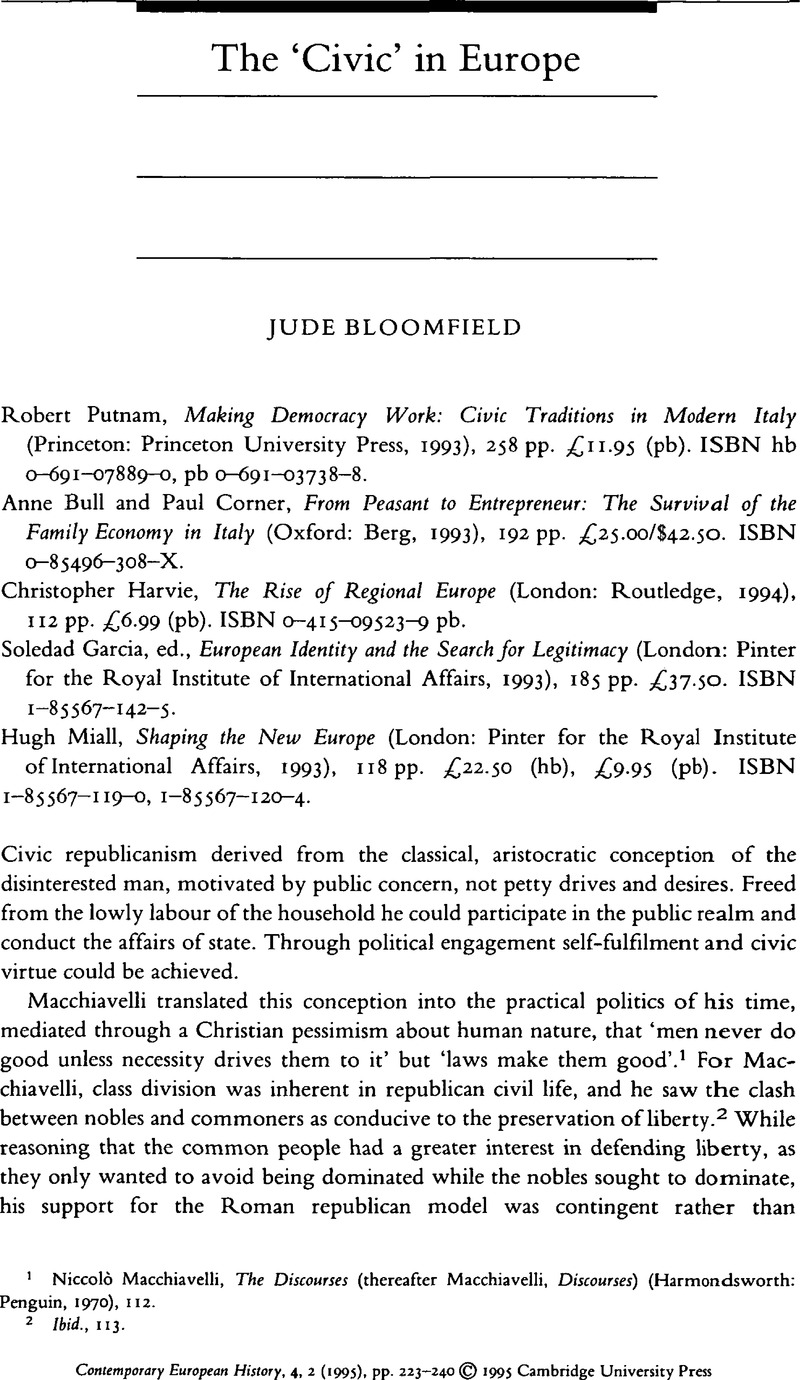No CrossRef data available.
Article contents
The ‘Civic’ in Europe
Published online by Cambridge University Press: 12 September 2008
Abstract

- Type
- Review Articles
- Information
- Copyright
- Copyright © Cambridge University Press 1995
References
1 Macchiavelli, Niccolò, The Discourses (thereafter Macchiavelli, Discourses) (Harmondsworth: Penguin, 1970), 112.Google Scholar
2 Ibid., 113.
3 See Guarini, Elena Fasano, ‘Macchiavelli and the Crisis of the Italian Republics’, in Bock, Gisela, Skinner, Quentin, Viroli, Maurizio, eds, Macchiavelli and Republic anism (Cambridge: Cambridge University Press, 1990), 29–34.Google Scholar
4 Macchiavelli, Discourses, 160–4; 243–8.
5 Pocock, J. G. A., The Macchiavellian Moment (Princeton: Princeton University Press, 1975), 550.Google Scholar
6 Habermas, Jürgen, The Structural Transformation of the Public Sphere (London: Polity Press, 1989);Google ScholarElias, Norbert, The Civilising Process (Oxford: Blackwell, 1978).Google Scholar
7 Making Democracy Work, 15.
7 Ibid.
9 Ibid., 154.
10 Ibid., 9–11.
11 Ibid., 21–3.
12 Hine, David, Governing Italy. The Politics of Bargained Pluralism (Oxford: Clarendon Press, 1993), 261–71.Google Scholar
13 See Donald Sassoon's summary in Contemporary Italy. Politics, Economy, Society since 1945 (London: Longman, 1986), 218.Google Scholar
14 See Salvatore Lupo's acid comment in ‘Usi e abusi del passato: le radici dell'Italia di Putnam’ (thereafter Lupo, ‘0Usi e abusi’), Meridiana. Rivista di Storia e Scienze Sociali, Vol. 18 for 1993 (1993).Google Scholar
15 Gabriel, A. Almond and Verba, Sidney, The Civic Culture (Princeton: Princeton University Press, 1963)Google Scholar, and Pateman, Carole, ‘The Civic Culture: A Philosophic Critique’, in Gabriel, A. and Verba, , Sidney, , eds, The Civic Culture Revisited (London: Sage, 1989).Google Scholar
16 Putnam, , Making Democracy Work, 26–38.Google Scholar
17 See Charles Lindblom's text on corporate influence on pluralist democracy, Politics and Markets: The World's Political Economic Systems (New York: Basic Books, 1977).
18 Lupo, , ‘Usi e abusi’, 162–3.Google Scholar
19 Putnam, , Making Democracy Work, 112.Google Scholar
20 For example, he passes over the similarity of educational attainment in the North and South, only to condemn the regional political élite in the South for almost all (87 per cent) having had a university education, while only about a third of regional councillors in the North have. The innocent explanation might offer itself that, in the absence of other economic opportunities, the state and region offer the main channels of employment for the educated in the South.
21 Putnam, , Making Democracy Work, 148.Google Scholar
22 Ibid., 151.
23 Ibid., 76.
24 Ibid., 71–5.
25 Ibid., 134, 150.
26 Ibid., 135.
27 Macchiavelli, Discourses, 246.
28 Le Goff, Jacques, 'The Town as an Agent of Civilization, in Cipolla, Carlo M., ed., The Fontana Economic History of Europe. The Middle Ages (London: Fontana, 1972), 94.Google Scholar
29 Zamagni, Vera, Dalla periferia al centro (thereafter Zamagni, Dalla periferia) (Bologna: Il Mulino, 1990), 19–20;Google ScholarEnglish ed., The Economic History of Italy, 1960–1990 (Oxford: Clarendon Press, 1993).Google Scholar
30 Cafagna, Luciano, Dualismo e sviluppo nella storia d'Italia (Venice: Editori Marsilio, 1989), 190–220;Google ScholarZamagna, , Dalla periferia, 21.Google Scholar
31 Braudel, , Structures of Everyday Life, 511.Google Scholar
32 Zamagni, , Dalla periferia, 42, 30–6.Google Scholar
33 Putnam, , Making Democracy Work, 233.Google Scholar
34 Corner, Paul, Fascism in Ferrara 1915–25 (thereafter Corner, Fascism) (Oxford: Oxford University Press, 1965), 109–10.Google Scholar
35 Cardozo, Anthony, Agrarian Elites and Italian Fascism: The Province of Bologna 1901–26 (Princeton: Princeton University Press, 1982), 325, 395.Google Scholar
36 Ibid., 349.
37 See Corner, Fascism, ch. 7; Marco Barnabei, ‘La base di masse del fascismo agrario’, Storia Contemporanea, Vol. 6, no. 1 (1976).
38 Bull, and Corner, , Peasant to Entrepreneur, 49.Google Scholar
39 ibid., 125.
40 D'Attorre, Pier Paolo and Zamagni, Vera, eds, Distretti imprese classe operaia. L'industrializzazione dell'Emilia Romagna (Milan: Franco Angeli1, 1992), 14.Google Scholar
41 Ibid., 19.
42 See also Caciagli, Mario, ‘Tra internazionalismo e localismo: l'area rossa’, Meridiana. Rivista di Storia e Scienza Sociali, Vol. 16 (1993), 83.Google Scholar
43 Giddens, Anthony, A Contemporary Critique of Historical Materialism. II: The Nation-State and Violence (London: Polity Press, 1985).Google Scholar
44 Urwin, D. and Rokkan, S., Economy, Territory, Identity: Politics of West European Politics (London: Sage, 1983).Google Scholar
45 Dunford, Mick and Kafkalas, Grigoris, eds, Cities and Regions in the New Europe (thereafter Dunford and Kafkalas, Cities and Regions) (London: Belhaven, 1992).Google Scholar
46 Harvie, , Rise of Regional Europe, 57.Google Scholar
47 Mick Dunford, ‘The Global-Local Interplay, Corporate Geographies and Spatial Development Strategies in Europe’ in Dunford and Kafkalas, Cities and Regions, 5.
48 Harvie, , Rise of Regional Europe, 68–9.Google Scholar
49 Mingione, Enzo, Fragmented Societies (Oxford: Basil Blackwell, 1992).Google Scholar
50 Hobsbawm, Eric and Ranger, Terence, eds, The Invention of Tradition (Cambridge: Cambridge University Press, 1983).Google Scholar
51 Bunyan, Tony, ed., Statewatching the New Europe (Nottingham: Russell Press, 1993) 29, 192–5.Google Scholar
52 Hélène Ahrweiler, ‘Roots and Trends in European culture’, in Garcia, European Identity, 32.
53 Robert Picht, ‘Disturbed Identities: Social and Cultural Mutations in Contemporary Europe’, in Ibid., 87.
54 Keohane, Robert and Hoffman, Stanley, ‘Community Politics and Institutional Change’, in Wallace, William, ed., The Dynamics of European Integration (London: Pinter, 1990).Google Scholar
55 Sennett, Richard, The Fall of Public Man (Cambridge: Cambridge University Press, 1977)CrossRefGoogle Scholar, and Habermas, Jürgen, Legitimation Crisis (London: Heinemann Educational, 1976).Google Scholar
56 See Melucci, Alberto, Creatività, miti, discorsi, processi (Milan: Feltrinelli, 1994);Google Scholar Alain Touraine, Les Mouvements Sociaux.


